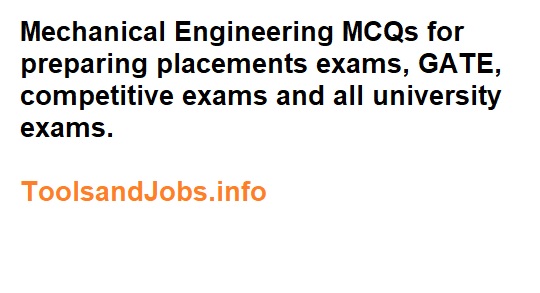Mechanical Elements MCQs In Basic Mechanical Engineering Part 2 for all competitive, placements and university exams.
Before solved this i suggest you read this
1. __ elements are used to transmit power from one part to another
A. Holding
B. Supporting
C. Power transmitting
D. None of the above
Ans. C
2. A coupling used to transmit power between two parallel shafts which are slightly offset
A. Oldham coupling
B. universal coupling
C. muff coupling
D. flange coupling
Ans. A
3. Stress induced in the balls or rollers of rolling contact bearing is
A. torsional shear stress
B. tensile stress
C. crushing stress
D. None of these
Ans. C
4. The rolling contact bearing is known as
A. sleeve bearing
B. thin film bearing
C. antifriction bearing
D. bush bearing
Ans. C
5. Parallel sunk key can be of___ crosssection.
A. Circular
B. Rectangular
C. Square
D. Both B and C
Ans. D
6. During slowing or stopping of vehicles ___ is used to disengage engine from wheels and enable smooth stopping of vehicle.
A. Clutch
B. Coupling
C. Brake
D. none of above
Ans. A
7. _________clutches are mostly used.
A. centrifugal clutch
B. cone clutch
C. multi-plate clutch
D. single plate clutch
Ans. D
8. The brake absorbs ……….energy given by objects being lowered by cranes elevators etc.
A. Potential
B. Kinetic
C. Thermal
D. Electric
Ans. A
9. In rigid flange coupling, one flange has projected portion and other has a corresponding recess for
A. bringing two shafts in line and maintaining alignment
B. transmitting torque from one flange to other flange
C. connecting two shafts
D. reducing the friction between the two flanges
Ans. A
10. The …….brake are used in hoisting machinery.
A. Disk brake
B. Drum brake
C. Double block
D. Band brake
Ans. B
11. The flexible flange couplings can ---
A. tolerate small lateral misalignment
B. not tolerate small lateral misalignment
C. tolerate small angular misalignment
D. Both A and C
Ans. D
12. Keys are subjected to ____ stresses.
A. crushing
B. shearing
C. both A and B
D. none of these
Ans. C
13. The overall size of________clutches is high.
A. Cone
B. Centrifugal
C. Single plate
D. All of the these
Ans. C
14. During slowing or stopping of vehicles ___ is used to disengage engine from wheels and enable smooth stopping of vehicle.
A. Clutch
B. Coupling
C. Brake
D. none of above
Ans. A
15. ………..is a device with the help of which artificial frictional resistance is applied to a moving machine.
A. coupling
B. Clutch
C. Brake
D. None of these
Ans. C
16. When the brake lever is released the two piston are pushed back by
A. Wheel hub
B. Fluid line
C. Brake disc
D. Retractor spring
Ans. D
17. The disc brake consists of ………………..
A. Rotating brake disc
B. Two friction pads mounted on either side of disc
C. Hydraulic caliper
D. All of these
Ans. D
18. In rigid flange coupling, the torque is transmitted from the driving shaft to the driven shaft ----.
A. directly
B. through flanges
C. through key-flange-bolts-key
D. through keys
Ans. C
19. The shafts will have same strength on
the basis of torsional rigidity, if
A. diameter and length of both shafts is same
B. material of both shafts is same
C. angle of twist for both shafts is same
D. all of above conditions are satisfied
Ans. D
20. Which is the correct statement,
A. cold rolling produces stronger shafts than hot rolling
B. hot rolling produces stronger shafts than cold rolling
C. cold rolling and hot rolling produces equally strong shafts
D. strength of shaft is independent of rolling processes
Ans. A
21. The function of key is
A. to connect transmission shaft to a rotating machine elements like gears
B. to transmit torque from shaft to hub and vice versa
C. to prevent relative rotational motion between the shaft and the connected element
D. all of above three functions
Ans. D
22. The standard taper for sunk key is
A. 1 in 100
B. 1 in 50
C. 1 in 10
D. 1 in 1000
Ans. A
23. In case of sunk key,
A. the keyway is cut in the shaft only
B. the keyway is cut in the hub only
C. the keyway is cut in both the shaft and the hub
D. none of the above
Ans. C
24. In case of sunk key, power is transmitted by means of,
A. friction force
B. shear resistance of key
C. torsional shear resistance of key
D. tensile force
Ans. B
25. The standard width for square or flat key in terms of shaft diameter D is,
A. d
B. d/2
C. d/4
D. d/8
Ans. C
26. The standard height for flat key in terms of shaft diameter D. is,
A. d
B. d/2
C. d/4
D. d/6
Ans. D
27. The standard length for square or flat key in terms of shaft diameter D is,
A. d
B. 2d
C. A.5d
D. 2.5d
Ans. C
28. The type of key used when the gear is required to slide on the shaft is
A. sunk key
B. feather key
C. Woodruff key
D. Kennedy key
Ans. B
29. The key in the form of semi-circular disk of uniform thickness is called,
A. sunk key
B. feather key
C. Woodruff key
D. Kennedy key
Ans. C
30. The key, which fits in the keyway of hub, only is called,
A. saddle key
B. feather key
C. Woodruff key
D. Kennedy key
Ans. A


